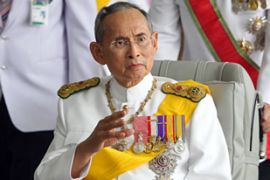Thai king avoids comment on crisis
King dodges mention of crisis, as stand-off with red shirts enters seventh week.

Vague comments
| in depth | |||||||||||||||||||||||||||||
|
His comments are being seen by some as a veiled reference to suggestions that the Thai authorities have failed to keep order when faced with the anti-government “red shirt” protesters who have taken over parts of central Bangkok.
The king’s lack of clear statement, however, apparently also signalled he was not prepared to take an active role in resolving the crisis, as he did in 1973 when he stopped violence during a student uprising and again in 1992 during anti-military street protests.
Bhumibol is the world’s longest reigning monarch, and has been hospitalised since September 2009, when he was admitted with fatigue and loss of appetite.
The red shirts have previously asked for an audience with the king in an effort to find a peaceful end the political stalemate which is now into its seventh week.
At least 26 people have been killed and nearly 1,000 wounded since the red shirts began occupying parts of the capital in a campaign to topple the current government.
Thai government officials have said they remain hopeful the dispute can be resolved without resorting to force, but they say they will not allow the protests to go on indefinitely.
In response, the red shirts have said they would launch unspecified nationwide action to prevent security forces from travelling to the capital to join what they believe is a looming crackdown.
Crackdown fears
Over the past week there have been mounting incidents of open defiance against the military and police by the red shirts, who fear the authorities are poised to clear their vast protest camp in central Bangkok.
Nattawut Saikuar, one of the leaders of the movement, said they would escalate their activities.
“We have made a resolution to take active measures against this government. Reds everywhere will stop police and army from coming to Bangkok,” he told the AFP news agency.
“We will step up our peaceful measures to stop the reinforcement. Our people will ask the police and army to return to their barracks.”
On Monday, about 60 red shirts blocked the entrance of a border patrol police camp in the central province of Phitsanulok to prevent a company from leaving for Bangkok.
Police eventually broke through the protest lines and scuffled with protesters.
Defiance
 |
| Anti-government protesters remain defiant in the face of a possible crackdown [AFP] |
A day earlier around 1,000 red shirts used a truck to block a main road into Bangkok and halt a convoy of vehicles carrying about 500 police, holding them for several hours.
The red shirts consist mainly of poor, rural supporters of former prime minister Thaksin Shinawatra and pro-democracy activists who opposed the military coup that ousted him in 2006.
They believe that the government of the current prime minister, Abhisit Vejjajiva, is illegitimate having come to power in a parliamentary vote after a court ruling dissolved the previous pro-Thaksin government.
The conflict has been characterised by some as class warfare, and a pro-government group known as the yellow shirts have demanded that authorities crack down on the demonstrators.
On Monday leaders of the yellow shirts threatened they would take direct action themselves to “protect the country” if authorities do not deal with the red shirts.
The threat came as a one-week deadline set by the yellow shirts, officially known as the People’s Alliance for Democracy (PAD), for an end to the crippling protests, expired with no end in sight to the tense standoff.
The political stalemate has rekindled fears of more unrest and a heavier toll on Southeast Asia’s second-biggest economy as more retailers shut their doors and tourist numbers dwindle.
